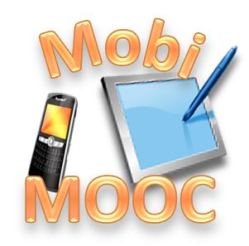 One thing I’m working on in my role at JISC infoNet at the moment is a Mobile Learning infoKit. It should be ready in time to complement the launch of JISC’s Emerging Practice in a Digital Age guide at ALT-C 2011.
One thing I’m working on in my role at JISC infoNet at the moment is a Mobile Learning infoKit. It should be ready in time to complement the launch of JISC’s Emerging Practice in a Digital Age guide at ALT-C 2011.
After the JISC Mobile & Wireless Technologies Review I carried out at the end of 2010, I’m keen to find out out the practice behind the theory and strategy I discussed in that (17,000-word!) review and have been looking for opportunities to do so. Thankfully, I’ve found just the thing.
A MOOC is a Massive Open Online Course, ably explained by Dave Cormier:
[youtube http://www.youtube.com/watch?v=eW3gMGqcZQc?hd=1&w=640&h=390]
A mobiMOOC is running from 2nd April until 14th May 2011 and anyone can take part! There’s a host of well-known names in the mobile learning world running sessions and facilitating, so I’m very much looking forward to it.
The benefit of the MOOC approach, of course, is that you can dip in-and-out at will, set your own learning goals, and (being mainly asynchronous) fit it around the rest of your life.
I hope you’ll join us.

Ever since 2007 when I started writing it, I’ve shared what I’ve written towards my Ed.D. thesis over at http://dougbelshaw.com/thesis. Today, given that I was a bit too ill to write for sustained periods of time (during the annual leave I took off specifically to do so) I decided to update and tidy it up a bit. It now reflects:
The design was inspired by this site and pimped with a bit of Media Query viewport: goodness so it looks half-decent on iPads.
 So there I was, tucking into my once-a-week lunchtime pizza, bathed in glorious sunshine, and sitting on the steps of Grey’s Monument in the centre of Newcastle. The smooth sounds of a highly talented musician (whom I’ll refer to as a ‘busker’ for convenience) was putting everyone in a good mood – or at least all those who had managed to dodge the charity workers multiplying like the city centre pigeons.
So there I was, tucking into my once-a-week lunchtime pizza, bathed in glorious sunshine, and sitting on the steps of Grey’s Monument in the centre of Newcastle. The smooth sounds of a highly talented musician (whom I’ll refer to as a ‘busker’ for convenience) was putting everyone in a good mood – or at least all those who had managed to dodge the charity workers multiplying like the city centre pigeons.
And then.
A column of blue entered my vision from the right as, penguin-like, a class of primary school children filed in front of me, two-by-two. Straining to be heard over the busker a middle-aged male teacher proceeded to lecture those children who could hear. His subject? A Brief, Boring and Rather Inaccurate History of Central Newcastle.
The children, meanwhile, did their level best to scribble down some ‘notes’ on flimsy pieces of paper with a blunt pencil. One lucky soul had obviously been a very good boy the week before and was snapping away using a disposable 35mm film camera. I was frustrated on their behalf.
When the busker realised what was happening he stopped playing and waited for the school party to move on. Had he not, the whole experience would have been an even more spectacular fail that it already was . The children were impeccably behaved, but the members of staff were so concerned about them following instructions that they didn’t even realise the courtesy the busker had shown them.
Walking back to work I realised that I’d just witnessed something I hadn’t experienced for twenty years. Back then, however, I had been on the other side as a child myself. Whilst in 1991 it was, to some extent, forgivable to run that kind of trip (it at least got us out of the classroom) in 2011 such practices are anachronistic and give schools a bad name. It was evident there had been no pre-trip use of online mapping tools. And why couldn’t all of the children take photos with their mobile phones (or school-provided digital cameras)? Why did they have to line up in twos? Why did they have to struggle to write on scraps of paper? Who’s trip was this?
Doing something for its own sake can be damaging and, as someone who has run school trips, there is absolutely no excuse for what I witnessed today. Conformity is not an end of education, but inspiration certainly is.
Image CC BY-SA Wm Jas
 One thing I’m working on in my role at JISC infoNet at the moment is a Mobile Learning infoKit. It should be ready in time to complement the launch of JISC’s Emerging Practice in a Digital Age guide at ALT-C 2011.
One thing I’m working on in my role at JISC infoNet at the moment is a Mobile Learning infoKit. It should be ready in time to complement the launch of JISC’s Emerging Practice in a Digital Age guide at ALT-C 2011.

